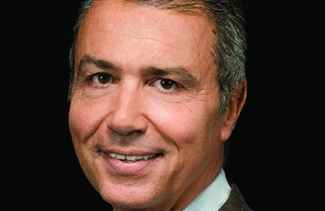
Ecole Moser – an institution committed to innovative teaching since 1961
- Interview with Alain Moser, Director General of the Moser Schools
The name is familiar, but few know much about the Moser School, which is ranked among the best private schools in Switzerland. It was founded 60 years ago by Henri Moser, a dedicated teacher with a heart of gold, who used his spare time to teach immigrant children to speak and write proper French. His precept was simple: a child is never stupid; any child’s success in life depends on the education that the child receives.
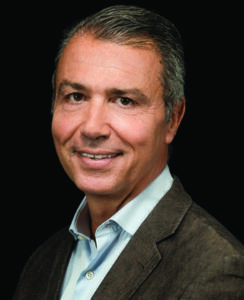 Mr Moser was fully committed to enabling these children to be fully integrated into society by giving them a chance to develop as human beings. The result was an initial school in 1961. Over the years the school developed further and not only grew in size but also expanded to two other locations. Today the school is present in Geneva, Nyon and Berlin. Its reputation is excellent, and there are some 40 different nationalities among the pupils, although the majority of the students are Swiss owing to the program for the Swiss baccalaureate (the maturité).
Mr Moser was fully committed to enabling these children to be fully integrated into society by giving them a chance to develop as human beings. The result was an initial school in 1961. Over the years the school developed further and not only grew in size but also expanded to two other locations. Today the school is present in Geneva, Nyon and Berlin. Its reputation is excellent, and there are some 40 different nationalities among the pupils, although the majority of the students are Swiss owing to the program for the Swiss baccalaureate (the maturité).
Let us leave the floor to Mr Alain Moser, Henri Moser’s son, who has continued in his father’s footsteps and has presided over the school’s management for almost 20 years. He will tell us more about the school, its underlying concept and how it cultivates the desire for learning and develops creativity among the pupils. It is fascinating, and one could only wish that there were more such schools.
Q: Could you tell us a little about how it all started?
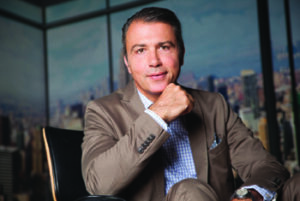 The École Moser is one of the last family-run schools in French-speaking Switzerland. Most of the other private schools have been bought by investment groups. There are perhaps one or two other family-owned schools left, but it has become an endangered species.
The École Moser is one of the last family-run schools in French-speaking Switzerland. Most of the other private schools have been bought by investment groups. There are perhaps one or two other family-owned schools left, but it has become an endangered species.
My father, Henri Moser, was a teacher in the Swiss public schools. He was ahead of his time and had innovating ideas when it came to education. He had a project enabling children who were not of French mother tongue to learn the language correctly. The first thing he did during his public-school days was to seat the immigrant children in the front rows in the classroom thus facilitating their effort to follow the classes, whereas other teachers would put them in the back, leaving them to themselves. At the end of the school day, he would continue giving French classes to these children. The caretakers of the school were not very happy about his arrangements, so, Mr Henri started giving private lessons in the pupils’ homes. People kept asking him: why don’t you set up a school? So, after some time, giving in to the pressure, he set up the first French language school, the Moser School. Later, the parents, happy with the French classes, asked him if he could expand the classes and to teach other subjects.
In 1986, he opened the school in Nyon. He had noticed that many of the pupils came a long way, going from one side of Lake Geneva to the other, so he decided that it would be better if he set up something on the other side, in Nyon. People told him, “You must be out of your mind. Nyon is a village. You won’t find anybody who will attend a private school there!” This proved wrong because as soon as we opened up, there were 80 pupils attending classes. So, we were the first school in this region, and the others followed one by one.
Over the years, we went from a few pupils to approximately 600 altogether, both in Nyon and Geneva, when I took over in 2001.
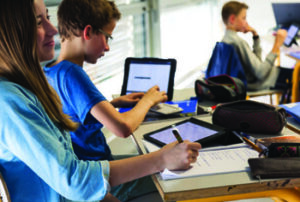
Q: What is the pedagogy behind the school?
From the very beginning we used what specialists call active pedagogy, or learning by doing. It’s always been the case at the school. The pupils come here to learn. Our mission can be summarized as cultivating a desire to learn and developing creativity. It is often said that a good school is one where the students work at school. My father, and this is also my stance, tried to reduce the homework as much as possible. It is also often said that a good teacher gives little homework whereas a poor teacher gives lots of homework. Because the poor teacher does so little with the pupils, they have to work at home. It is not right that children spend eight hours at school and then spend several hours at home in the evening doing homework.
My father had simple principles. He was very pragmatic and had lots of common sense. I think that common sense has largely disappeared in the schools, and I think it’s important to go back to basics.
We all know that you do not learn to speak a language simply by attending language classes. A language is properly learned by immersion, either by going to a school in the country where it is spoken, or by being taught subjects in that particular language. At Moser, we teach drawing in German, biology in English, maths in German or English or French and so forth.
We use the languages to teach the subjects. In this way, the children use the language in varying contexts. There are of course language classes where the children learn grammar, vocabulary etc., but by using this approach we see the children making tremendous progress. They do not learn the language by learning vocabulary by heart but by using it in different settings.
My father was a pioneer in teaching by immersion, teaching German in particular. Owing to his efforts, the school was accredited for the German-English bilingual maturité (the Swiss baccalaureate). He set up the Association genevoise des écoles privées and was the president of the Association suisse des écoles privées.
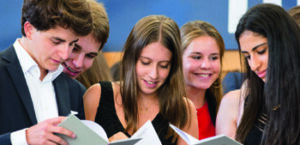 Q: When did you take over the schools?
Q: When did you take over the schools?
I joined the school in 1996. The school in Nyon needed somebody to carry out daily management, so, I stepped in and remained there for six years. Then I returned to Geneva. It was at that time that we built this new building here at Chêne-Bougeries. It brought with it a slightly different pedagogy with amphitheaters where the classes are taught. There are no traditional classrooms but science laboratories of different sorts. Today we have 700 pupils in Geneva and 400 in Nyon. Ten years ago, I set up a subsidiary in Berlin to make linguistic exchanges.
Q: Why did you decide to set up a subsidiary school in Berlin?
In general, the French-speaking Swiss do not like the German language. They have to learn it in school, but they rarely use it. It’s therefore very hard to make pupils love German. I asked myself why, and how to go about making them like German, because it’s fundamental. In order to motivate children to use German, the idea was to send them to Berlin to use their language skills. I looked for partner schools in Germany where French was taught, but we did not find a suitable partner. So, I told my colleagues, that if we want the pupils to like German, we have to make them like Germany. And what is better than Berlin? Berlin is the “New York” of Europe, and I love Berlin myself.
I brought my family with me and set up the school. In the beginning we had only one class, but it soon became a success. What my father spent 30 years of his life to build here in Switzerland took me 10 years in Berlin.
Q: What are the differences between yours and the other schools?
It is the concept that’s different. We have a mission, and that consists of developing the desire to learn and stimulating the pupil’s creativity. Children are hypercreative. If you listen to TED talks, Ken Robinson says school kills creativity. I think he is right, and this is why we are encouraging it here, in this school.
There are three areas – the first involving academic skills of a very high level. The Swiss baccalaureate, or maturité, is extremely difficult to obtain. Only 20 percent of the pupils in Switzerland succeed in earning this diploma. In comparison, for the French baccalaureate, it’s 90 percent, for the German, approximately 60 percent. We are the Swiss school of reference. The novelty is that we now offer our pupils double diplomas – the International Baccalaureate and the maturité. We are the only school in Switzerland offering these two diplomas to our pupils. In the other schools, the pupil chooses either one, at our school they get both!
In other words, a very high academic level and social skills are key here. The International Baccalaureate also encourages social skills, but the learning environment in our school can be described as positive discipline which consists of firmness and kindness. It consists of developing collaboration, autonomy and responsibility. If we develop these skills in the children, they learn better. We have a pedagogical system that makes the children collaborate, and they are show solidarity with each other.
The second area that we develop is digital proficiencies. What is digital at the Moser School? It consists of three different aspects. The first is about how it works – programming and understanding the digital language. It is important that in the twenty-first century we understand this language. The second is: in which context do we use it? Is it important to have an iPad in the French class? What is the added value of using an iPad in French, or mathematics? What more does the iPad bring to the subject? If there is no value added we do not use it. They all have IPADs, but they also have textbooks and they love to read. Last year the school library handled more than 16,000 book loans. There are 700 pupils, so it suggests that they read a lot. In the digital classes they are taught why we use it and in which context.
Finally, media education is the third one. Here we look at the trace I leave in the digital sphere; the fake news; property rights; photos. We bring one of Switzerland’s best experts on the cyberspace to give lectures on what to do and not to do in cyberspace. Thus, we start developing these skills in the primary education and continue until the pupil is off to university.
My utmost goal is that the children succeed in university, and that’s the reason why we train them to be independent, to work in groups and provide them with digital skills. We arm them for tomorrow’s challenges.
Q: What are the criteria to be admitted to your school?
In general, what happens is that often parents come to see us because their child is bored in school. They tend to have a good academic record, but the parents have the impression that their child could do better, or does not get enough challenges in school, so we receive the pupil and the parents. The youngest ones fill out a portfolio with different elements – a drawing, a text etc., and bring something he/she would like to show us.
Positive discipline by Dr Jane Nelson is the basic philosophy of our school. In fact, it was in the 70s, in the Bronx, that Dr Jane Nelson noticed that always blaming the same pupils resulted in higher dropout rates and school failures. What is nice about positive discipline is that by developing resect, collaboration and responsibility, what happens? We encourage learning. So, when you develop that in the children, they learn better.
The Moser School is the only certified positive discipline school in Switzerland for its whole school. All the Moser collaborators have followed the Positive Discipline Seminar. We need to be kind and strict.
Q; In addition to the school, it seems you have set up two other initiatives, one is on-line and the other is in the village of Leysin. Could you please tell us more about these two projects?
We had chalets in Leysin where we had summer and winter camps. We are currently constructing a building that will be for the winter and summer camps, but that also can be used as a centre for teacher training, the Moser Institute. All together there are 110 beds, in rooms of 4 each with bathrooms, open space for co-working, a big kitchen where people can cook together. There is also a climbing wall and many other facilities. It’s really nice. What is even nicer is that you can go there by train. The train stops just in front of the building, and it’s direct from Geneva.
Q: Do you have any particular training for the teachers? If yes, what does it consist of ?
It consists of the use of digital tools in the school. Next week, I will train other headmasters on how to set up a digital strategy in the schools – how to train the teachers, and how to get them on board. We know how to do so. We have in fact developed training modules on different topics such as how to use Teams in an efficient way, how to make short videos to explain complex issues.
We also use videos in what we call inverted classes. That is, the theory at home and the experiment in school. For instance, on how to make soaps. It’s a complex issue, and the theory is quite difficult to understand. So, what we have done is to make a short video where the teacher explain the theory. The pupil’s homework consists of watching the video and the next day they will do the practical work in the science laboratory.
We have a digital platform called Matuonline.ch where you will find all the classes given by the teacher of chemistry, biology, mathematics… It is the whole programme. The teachers explain on-line, there are excises, and it’s really well done. The pupils have access to this free of charge. Last year there were 3,000 pupils from other schools who bought the classes online.
From time to time I meet pupils from the other institutions, and some come to thank me for this initiative. It’s really gratifying.





